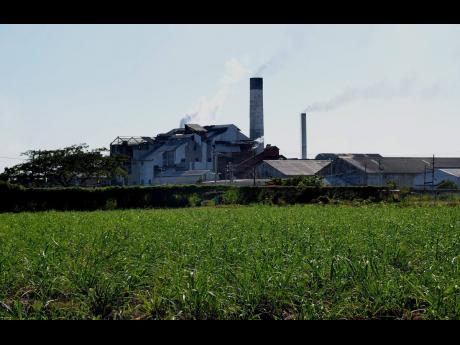Local firms not in US$300-million regional white sugar upgrade
Jamaican sugar producers are not participating in a planned injection of some US$300 million to produce refined white sugar and more of the semi-refined product known as plantation white sugar, as the Caribbean sugar sector celebrates a Caribbean Community (CARICOM) trade ruling promising tougher policing of the common external tariff (CET) regime to protect the regional sugar market.
The St Catherine-based Worthy Park Estate, the most efficient sugar producer in the country, has put on hold its planned production of plantation white or liquid sugar for use in manufacturing baked products, drinks, confectioneries and other sweets.
“Initially, there is not going to be enough sugar produced locally to justify the investment in a sugar refinery or liquification plant,” William Mahfood, chairman of manufacturing and distribution company Wisynsco, which owns 30 per cent of Worthy Park, told the Financial Gleaner this week. This is against the background of total brown sugar production from Appleton, Frome and Worthy Park operations for the current crop year being projected to be just enough to satisfy the Jamaican direct consumption market of roughly 40,000 tonnes.
However, chairman of the Sugar Association of the Caribbean (SAC), Karl James, says Guyana and Belize are putting the money into their operations and moving ahead with plans to upgrade their sugar factories to expand plantation white and move to produce refined grade sugar. The production push comes as regional sugar producers have been mandated to increase production of white sugar at least to a level that meets 75 per cent of the regional market demand, and at a quality that satisfies regional manufacturers before there is stricter enforcement of the CET on that product.
The mandate came at a November meeting of CARICOM trade ministers in Guyana, where the regional body heeded years of lobby by SAC to immediately tighten the mechanism for ensuring that brown sugar produced outside the 15-member bloc and sold into the regional market attracts the 40 per cent CET mandated by the Revised Treaty of Chagauramas that governs the grouping. Calls by SAC for the same treatment to be applied to white sugar, although bolstered by a regional study by the Caribbean Development Bank which showed plantation white to be suitable for manufacturing, elicited the conditional agreement.
The sugar producers have nevertheless welcomed the decision and some are now about to invest in refineries. At present, over two-thirds of market demand for white sugar in CARICOM – amounting to some 200,000 tonnes – is imported from outside the region without the CET, leaving sugar producers to export their product on the global market at what SAC maintains are uncompetitive prices.
Producers in Belize, who already manufacture what is regarded as a fairly good quality plantation white, are planning to increase the quantity of that product while upgrading their plants to do refined sugar. In Guyana, the government-owned Guyana Sugar Company (GUYSUCO) has invited interested private-sector parties to begin production of plantation white and refined sugar.
James says his association will be keeping up the pressure to ensure the regional body follows through on the decision. At the same time, SAC is looking forward to discussions with regional manufacturers about the price to be paid for regionally produced white sugar. Price has been an issue driving the duty-fee importation of refined sugar by some countries with CET waivers agreed by CARICOM.
“The treaty does not address price at all. As a commodity you cannot set the price of sugar. The world market price is where you start from. We are open to negotiate with the users and you may have different prices in different countries. It is negotiable,” James says.
It is already clear that price will remain a fly in the ointment, so to speak, with manufacturers bristling at the prospect of paying more for regionally produced refined sugar than they now pay for the commodity bought externally. For example, the umbrella manufacturers and exporters body in Jamaica, the Jamaica Manufacturers and Exporters Association (JMEA), is supporting the CARICOM decision with the caveat that it does not result in any increase in cost to manufacturers.
“Whatever happens we must not be put at a competitive disadvantage to either import or export to other markets. We do not want any additional taxation or duty impact on our businesses to affect our competitiveness,” JMEA president Richard Pandohie told the Financial Gleaner last week.
Pandohie says manufacturers in CARICOM member countries have been having dialogue with their respective governments to make this point and to sensitise government ministers and technocrats who deal with these policy issues, to the concerns of the processors.
Pandohie maintains that while the COTED ruling does not address the issue of price, the CET implies that the price of the extra-regional product with the CET should be at least 40 per cent above the price of the regionally produced product.
Pandohie is chief executive officer of Seprod, which only recently exited sugar production after the company suffered huge losses over many years on its Golden Grove sugar operations in St Thomas. He is also supportive of the restatement by CARICOM of the existing rules that all brown sugar entering the market must attract the CET in order to protect the brown sugar produced in the region.
“The COTED ruling (on brown sugar) is already in place. There is a mechanism for that. What they (CARICOM sugar producers) have been asking for is the implementation of what already exists, which we believe is the right thing to do,” he adds, noting that duty-free importation of brown sugar has had a damaging impact on all sugar producers in CARICOM markets.


